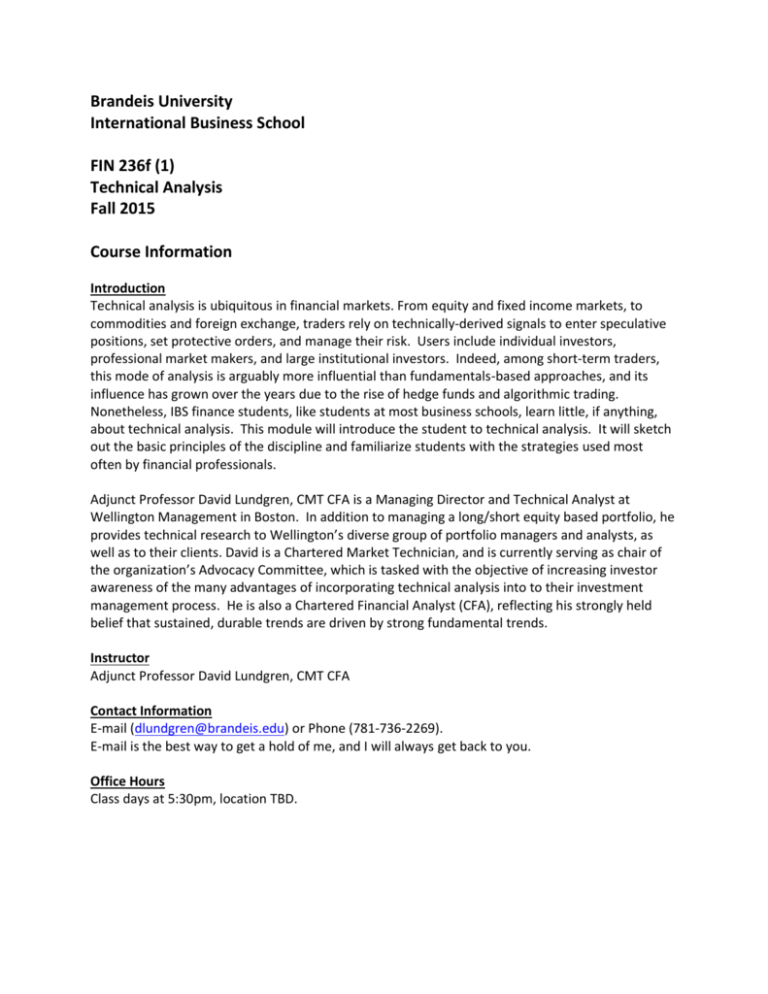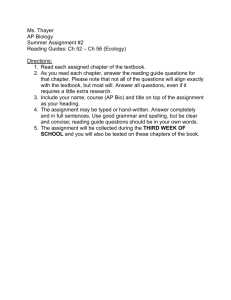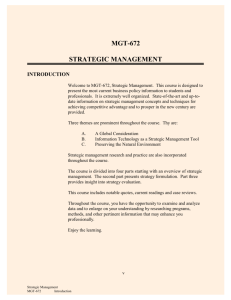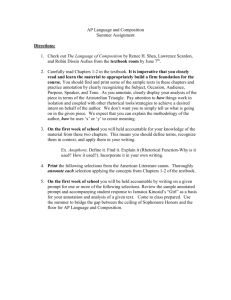Technical Analysis Fall 2015 Course Information
advertisement

Brandeis University International Business School FIN 236f (1) Technical Analysis Fall 2015 Course Information Introduction Technical analysis is ubiquitous in financial markets. From equity and fixed income markets, to commodities and foreign exchange, traders rely on technically-derived signals to enter speculative positions, set protective orders, and manage their risk. Users include individual investors, professional market makers, and large institutional investors. Indeed, among short-term traders, this mode of analysis is arguably more influential than fundamentals-based approaches, and its influence has grown over the years due to the rise of hedge funds and algorithmic trading. Nonetheless, IBS finance students, like students at most business schools, learn little, if anything, about technical analysis. This module will introduce the student to technical analysis. It will sketch out the basic principles of the discipline and familiarize students with the strategies used most often by financial professionals. Adjunct Professor David Lundgren, CMT CFA is a Managing Director and Technical Analyst at Wellington Management in Boston. In addition to managing a long/short equity based portfolio, he provides technical research to Wellington’s diverse group of portfolio managers and analysts, as well as to their clients. David is a Chartered Market Technician, and is currently serving as chair of the organization’s Advocacy Committee, which is tasked with the objective of increasing investor awareness of the many advantages of incorporating technical analysis into to their investment management process. He is also a Chartered Financial Analyst (CFA), reflecting his strongly held belief that sustained, durable trends are driven by strong fundamental trends. Instructor Adjunct Professor David Lundgren, CMT CFA Contact Information E-mail (dlundgren@brandeis.edu) or Phone (781-736-2269). E-mail is the best way to get a hold of me, and I will always get back to you. Office Hours Class days at 5:30pm, location TBD. Course Description This module course will cover the philosophy and rationale for technical analysis and introduce the student to the classic and current methods of analyzing market activity. Technical analysis is the study of price action in trading markets. Its purpose is to use known patterns and trends existing in the price behavior of financial securities to make profits and minimize capital losses. This course will introduce trading tactics, the use of patterns and indicators of market price change, the application of those indicators, and most importantly the value of communicating technical phenomena in layman’s terms. Some basic statistical knowledge, familiarity with spreadsheets, and understanding of stock market terms will be required. We will apply technical analysis across asset classes, including global equities, commodities, currencies, and interest rates. Prerequisite FIN 201a Learning Goals and Outcomes Understand the underlying principles of technical analysis of financial markets. Understand the effect of human psychology on markets and prices. Understand the self-discipline necessary to successfully invest or trade. Understand the basic patterns, trends and signatures implicit in prices and their predictive potential. Understand capital risk and volatility risk. Understand how to profit from price behavior. Understand how to develop a trading or investment model with quantifiable capital risk. Understand the imperfections and risks involved in following a technical model. Class Hours Monday 6:30-9:30pm, August 31 to October 26, 2015, location International Hall. Course Materials Technical Analysis: The Complete Resource for Financial Market Technicians, 2nd edition, Kirkpatrick and Dahlquist, (2010: FT Press, New Jersey). Evaluation For most weeks, students will read the text and related readings, and will complete a problem set individually. At the end of the semester, students will carry out a substantial take-home assignment in lieu of a final examination. Grading: Homework 50% Final assignment 25% Class participation 25% & Attendance Course Plan Week 1 (8/31) What is Technical Analysis? The Technical Analysis Controversy. Textbook chapters 1, 2, 3, 4 & 5 Week 2 (9/10) Trend-Following Strategies Textbook chapters 6, 12, 13 & 14 Week 3 (9/21) Chart Patterns Textbook chapters 15 & 17 Week 4 (9/29) Confirmation- Volume and Momentum Textbook chapter 18 Week 5 (10/12) Advanced Technical Strategies & Stock Selection Textbook chapters 16 & 21 Week 6 (10/19) Broad Market Analysis & Sentiment Textbook chapters 7, 8 & 9 Final Exam (10/26) Take-home case study is due by Monday, October 26th at 5:00pm ET. Disabilities If you are a student with a documented disability on record at Brandeis University and wish to have a reasonable accommodation made for you in this class, please see me immediately. Academic Honesty You are expected to be honest in all of your academic work. Please consult Brandeis University Rights and Responsibilities for all policies and procedures related to academic integrity. Students may be required to submit work to TurnItIn.com software to verify originality. Allegations of alleged academic dishonesty will be forwarded to the Director of Academic Integrity. Sanctions for academic dishonesty can include failing grades and/or suspension from the university. Citation and research assistance can be found at LTS - Library guides Course Policies Students missing more than two class periods are subject to removal from the class. Food, drink, or wearing hats are not permitted in the classroom. Cell phones are to be turned off during class. Students are fully responsible for all work, exams, and homework covered during an absence. Students are expected to be on time for class. Any late homework or exam will drop one letter grade for each day it is late. Homework is due at the beginning of class. While it is often helpful to work with others on homework and on the final paper, the risk is that you will not fully understand the material if you don't work on the questions yourself. That means I will be especially watchful for students who are not doing the work and are copying the work of others. Copying the work of others is plagiarism and a serious breach of academic integrity as well as a quick way to receive a poor grade. Please don't make me report you for such behavior. Useful Websites Technical Analysis www.stockcharts.com Free technical analysis tools Market Commentary www.minyanville.com www.seekingalpha.com www.ritholtz.com/blog www.zerohedge.com Great banter on the markets Thought pieces on macro environment, stocks Big Picture blog is a must read for macro Great strategy pieces Visualizations www.finviz.com www.flowingdata.com www.edwardtufte.com Excellent visualizations of market dynamics Not financial-specific, but great examples The King of Visualizations Education www.mta.org stockcharts.com/school Market Technicians Association, CMT program Fantastic tutorials on technical analysis






